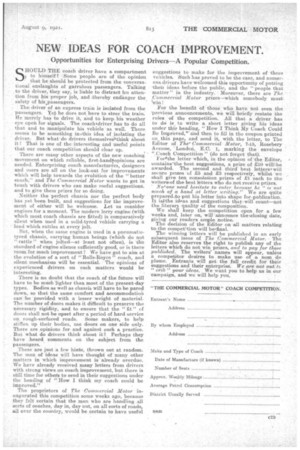NEW IDEAS FOR COACH IMPROVEMENT.
Page 15

If you've noticed an error in this article please click here to report it so we can fix it.
Opportunities for Enterprising Drivers—A Popular Competition.
SHOULD THE coach driver have a compartment ? to himself ? • Some people are of the opinion that he should be protected from the conversational onslaughts of garrulous passengers. Talking to the driver, they say, is liable to distract his attention from his proper job, and ,thereby encling-er the
safety of his,passengers.. •
The driver of an express train is isolated from the passengers. Xet he does not have to steer the train. He merely has to drive it, and to keep his weather eye open for signals. The coach:driver has to do all that and to manipulate his vehicle as well. There seeins to be something in this idea of isolating the driver. But what-do drivers themselves4hink about it? That is one of theinteresting and useful points
that our coach competition should clear up. , There are many other aspects of the new coaching • movement on which reliable, first-handtopinioes are needed. Enterprising coach manufacturers, designers and users are all on the look-out for improvements which will help towards the evolution of the "better coach," and The Commercial Motor wants to get in touch with driver& who can make useful suggestions. and to give them prizes for so doing.
Neither the perfect chassis nor the perfect body has yet been built, and suggestions for the improvement of either will he welcome. Let us consider engines for a moment. The modern lorry engine (with which most coach chassis are fitted) is comparatively silent when used in a solid-tyred vehicle carrying a load which rattles at every jolt.
But, when the same engine is used in a pneumatictyred chassis, carrying human beings (which do not "
rattle-" when jolted—at least not often), is -the standard of engine silence sufficiently good, or is there room for much improvement? We have got to aim at the evolution of a sort of " Rolls-Boyce " coach, and silent mechanism will be essential. The opinions of experienced drivers on such matters would be interesting.
There is no doubt that the coach of the future will have to be much lighter than most of the present-day types. Bodies as well as chassis will have to be pared down, so that the same comfort and accommodation can be provided with a lesser weight of material. The number of doors makes it difficult to preserve the necessary rigidity, and to ensure that the " fit " ef doors shall not be upset after a period of hard service on rough-surfaced roads. Some makers, to help stiffen up their bodies, use doors on one side only. There are opinions for and against such a practice. But what do drivers think about it ? Perhaps they have heard comments on the subject from the passengers.
These are just a few hints, thrown out at random. The man of ideas.will have thought of many other matters in which improvement is already overdue. We have already received many letters from drivers with strong views on coach improvement, but there is still time for others to send in their suggestions under the heading of "How I think my coach could be improved."
The proprietors of The Commercial Motor inaugurated this competition some weeks ago, because they felt certain that the men who are handling all sorts of coaches, day in, day out, on all sorts of roads, all over the country, would be certain to have useful suggest-ions to• make. for the improvement of these vehicles. )Suelt has proved to be the case, and numer ous drivershav-e welcomed this opportunity of putting theh ideas before the public, and the "people that matter" in the industry. Moreover, there are The Commercial Motor prizes—which somebody must, 'win!
For the benefit of those who have not seen the 'previous announcements, we will brietly restate the rules of the competition. All that a driver has to do is to write a short letter giving his ideas under this heading, "How I Think My Coach Could Be• ftriproVed,'inel then to fill in the coupon printed on this page, and send it, with the letter, to The Editor of Thee Commercial Motor, 7-15, Rosebery Avenue, ' London, E.C. 1, marking the envelope "Coach Competition" (do not forget that).
For.the letter which, in the opinion of Editor, eoritains•the best suggestions, a prize of 210 willthe awarded. The second and third best letters+d will secure prizes of 25 and 23 respectively, whilst we shall give ten consolation prizes of 21 each to the writerstof the best letters who do not receive prizes. • Noione need hesitate to enter because he " is not much of a hand at letter writing." We are quite prepared,to put his letter into shape for. publication. It isithe ideas and suggestions thata will count—not the literara quality of the composition.
We shall keep the competition open for a few weeks and, later on, will 'announce thekclosing date, giving our readers ample notice.
The decision of the Editor on all matters relating tot-he competition will beifinal.
The winning letters will be published in an early subsequent issue of The Commercial Motor. The Editor also reserves the right to publish any of the letters Which do not win prizes, and to pay for those published. The writers' names will appear, unless a competitor desires to make, use of a nom de. plume. Entrants will get the full credit for their suggestions and their enterprise. We are not out lc "crib" your ideas. We want you to help us in our campaign, and we will help you,
































